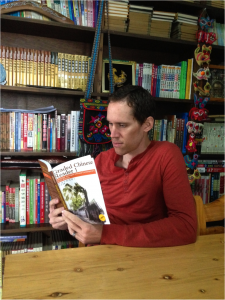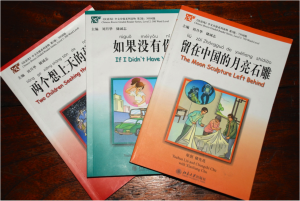The Difficulties of Translation: Love Translated
To language enthusiasts, it’s sometimes a bit of a shock to see how a favourite book or film title is rendered in another language. A common phrase, especially since the film which took it as a title, is ‘Lost in Translation’, the idea of some slight nuance being dropped between one language and another.
But sometimes it’s more than just a little nuance. Sometimes it’s a total transformation of the title, and a total change in meaning. Consider the phrase ‘lost in translation’ itself: a clever play on the idea of physical loss and metaphoric loss, it contains both the sense of merely overlooking something, and of being geographically lost- as well as emotionally bewildered. It’s a poignant phrase. Now consider the title of this blog post: ‘The Difficulties of Translation’ (Трудности перевода) is the Russian title for the same film, while ‘Love Translated’ (L’amore tradotto) is the distinctly simplified Italian variant.
Italian also simplifies one of the most beautiful film titles of this age: ‘Eternal Sunshine of the Spotless Mind’. The original title conjures images of endless hope, while the Italian ‘Se mi lasci ti cancello’ (If you leave me, I’ll delete you) narrows the ambit significantly and reduces the complex plot to the mere idea of a lovers’ tiff. Similarly, ‘The Catcher in the Rye’, the incredibly evocative title of Salinger’s great classic, certainly loses its panache and the protagonist’s sense of anonymity in the Italian edition, ‘Il giovane Holden’ (The Young Holden).

Needless to say, this works both ways, and anyone who is familiar with Proust’s famous work ‘À la recherche du temps perdu’ will be disgusted by the rather trite English version, ‘Remembrance of Things Past’ (thankfully renamed in more recent publications to ‘In Search of Lost Time’). Similarly, Camus’ ‘L’Étranger’ is only ever translated as ‘The Outsider’ or ‘The Stranger’ in English- unlike the French, English lacks a word which encompasses both nuances at once.
Got any favourite translations of titles in other languages? We’d love to hear them, whether you think they’re better or worse than the original!
Learning Latin with Harry Potter
Just before Christmas I helped our language producer record Latin, which will be coming to uTalk later in the year. Whilst listening to the Latin speakers I found I recognised some of the words (although I have never learnt Latin before). And then I realised this was due to my love for/slight obsession with Harry Potter.
As a child I would read every Harry Potter book that came out (this could take some time, as my mum would read it first, followed by my sister, then my dad and then finally me; by which point my mum would have already disclosed a summary of the book including 100 different spoilers!). The extremely clever use of Latin has helped to allow the Harry Potter stories to become even more accessible worldwide, as Latin runs through many modern romance languages, such as French and English. It is also a language that isn’t as widely used or known in modern society anymore.
A few examples of J.K.Rowling’s use of Latin:
- ‘Protego’, which is a shield charm that creates a magical barrier, literally means ‘protect’ in Latin.
- ‘Lumos’, which produces a burst of light, is related to the Latin word lumen – which directly translates into light.
- ‘Crucio’ one of the ‘forbidden curses’ which causes a lot of pain, means ‘I torture’ in Latin.
- ‘Expecto Patronum’ which is used to produce a spirit animal to shield you from dementors, translates into ‘I wait for a patron’ in Latin.
- ‘Levicorpus‘, which is a spell that suspends someone from their ankles in mid-air, is a combination of two Latin words: levare, which means ‘lift’, and corpus translates as ‘body’.
These spells are pretty self-explanatory when you know Latin!
Again, the Latin theme can be found across names used in Harry Potter, often describing their personality or role in the books.
- Remus Lupin – his surname means wolf (which Hermione worked out early on in the third book).
- Draco – means dragon although the character’s surname, Malfoy, is actually French for ‘bad faith’.
- Severus (Snape) – means ‘stern’ in Latin, which is an appropriate word for Hogwarts’ meanest teacher!
- Sirius Black – it’s no coincidence that this character’s named after the Dog Star.
- Ludo Bagman – he’s the head of the Division for Magical Games and Sports, so it makes sense that his first name, Ludo, means ‘I play’ in Latin.
Can you think of any more examples of Latin in Harry Potter?
Alex
How to learn a language on a budget
Why do people give up on learning a language?
There are many answers to this question, of course. Recently, we’ve been running a survey (which you can still complete, if you have two minutes), about language learning, reasons for learning and things that might get in the way. According to the results so far, two of the top answers given to the above question are: lack of time, and lack of money.
 As I know only too well, language classes, private tutors and language CDs or books can quickly become very expensive. Having recently decided to try and upgrade my schoolgirl French, I had a look round at languge tuition and was pretty depressed to see that I would struggle to afford even a few weeks of classes. But never fear, there are plenty of ways to learn even if you can’t afford to go back to school or buy expensive subscriptions.
As I know only too well, language classes, private tutors and language CDs or books can quickly become very expensive. Having recently decided to try and upgrade my schoolgirl French, I had a look round at languge tuition and was pretty depressed to see that I would struggle to afford even a few weeks of classes. But never fear, there are plenty of ways to learn even if you can’t afford to go back to school or buy expensive subscriptions.
So here’s my short guide to how you can learn a language on a budget. Happy learning!
1. Online
There are a tonne of great resources to be found online without even paying a penny. Depending on your language, there are loads of websites for learning grammar, vocab and more. And you can often find really good sites for more advanced learners – I really love RFI for practising French (they have news reports in ‘easy’ French, with text transcriptions). For beginner to intermediate learners, busuu.com has a great programme for 12 languages, including grammar, reading, writing and vocab, and even allows you to chat with native speakers.
2. Media
This probably only applies to intermediate to advanced learners, but it’s my favourite way to practise the languages I already speak. Try watching movies in your language, with English subtitles, or subtitles in the language. Or Google the online version of a newspaper in that language (if I’m feeling very motivated, I read lemonde.fr, spiegel.de or elmundo.es). The radio is also a great tool for language absorption. You can listen to radio in almost any language at tunein.com (and they have a great app for on-the-go listening). Even just listening to some music in another language gets you used to the sound.
3. Flashcards
I used to be obsessed with these when I was at school and uni. In my opinion, this is a great way to cram vocabulary. Either make your own with paper (write the foreign word on one side and the English word or a picture on the other) and test yourself or get a friend to test you. Or, even better, there are some free programs to do just that, which even remember which words you’re weaker on and bring them up more often until you get them right. I used to use this on the computer, but you can get flashcards in app form now too.
4. Find other people to speak to
Ok, I’ve got it easy here because we have a very international office and I’m never short of someone to annoy with my dodgy Spanish… But even if you’re not surrounded by native speakers, you might be able to track down a language partner using a website like totalingua.com that matches you up with an exchange partner. If no one lives in your area, you can always arrange a Skype chat instead of meeting face to face.
5. Apps
There are some amazing free or cheap apps to download on iPhone or Android. I’m using a combination of DuoLingo and uTalk to learn basic Italian. DuoLingo is free and gives you a good grounding in grammar and basic vocab, whilst uTalk features native speakers for all (70 and counting) languages, and has real audio for all the phrases and vocabulary, so I can pick up on the accent and pronounciation as well. I normally play a couple of the games on the bus to work, although I save the recording quizzes for the privacy of my room!
6. Books
If you’re more of a paper and pencil type, then there are plenty of language-learning books on the market, and they’re mostly cheap to buy, or you can track some down second hand. I think there’s something to be said for having a paper dictionary if you’re a serious language learner (what if leo.de is down!?) – even if you just decorate your shelves with them to look intellectual (or is that just me?).
Have you got any more tips for people learning a language on a budget?
Alex
Next week: our guide to learning a language when you’re short of time. If you’ve got any particularly useful tips you’d like to see included, please let us know below!
The true meaning of character names from fiction
The other day, I was watching one of my favourite films, The Lion King (yes, I know it’s a kids’ film but I love it) and I was reminded of a fun fact I read recently, that many of the characters’ names are taken from Swahili. Simba means ‘lion’, Rafiki means ‘friend’, ‘Nala’ means ‘gift’ and Pumbaa means ‘simpleton’. Poor Pumbaa.
So often when we watch a film or read a book, we take for granted that the characters are just called whatever they’re called, without considering why. So here are a few more examples – some of which may be surprising, but all of which I hope will be interesting.
Disney
The Lion King isn’t the only Disney film to give its characters significant names. In Beauty and the Beast, perhaps most obviously, the heroine’s name, Belle, means ‘beautiful’ in French. But many of the other characters resemble their names somehow, like Mrs Potts (the teapot), Cogsworth (the clock) and everyone’s favourite candelabra, Lumière, which means ‘light’.
In Sleeping Beauty, the name of the villain Maleficent comes from the Latin ‘maleficus’, meaning ‘wicked, prone to evil’. Seems appropriate. And on a similar theme, Cruella DeVille from 101 Dalmatians is pretty self-explanatory.
The Jungle Book
I think Rudyard Kipling would object to me listing this under Disney, although that might be where many people know The Jungle Book from. Shere Khan translates roughly as ‘Tiger King‘ (‘shir’ is ‘tiger’ – or ‘lion’ – in Persian, Punjabi and Hindi, while ‘khan’ is ‘king’ in many languages). ‘Bhalu’ (Baloo) means ‘bear’ in Hindi, and the ‘bagh’ in ‘Bagheera’ means ‘tiger’ – which is slightly confusing since Bagheera’s a panther.
Lord of the Rings
In J.R.R. Tolkien’s trilogy, the character Frodo Baggins gets his first name from the Old English word ‘fród‘, which means ‘wise by experience’.
Game of Thrones
The character names in George R.R. Martin’s books, and the accompanying TV series, for the most part seem to be modern names with a slight twist (Robb, Jaime, Eddard), but there is one character whose name has a deeper meaning – Bran Stark, whose first name is Irish for ‘raven‘. Fans of the series will know about the three-eyed raven, who plays a significant role in Bran’s story from the start.
Star Trek
I’m not much of a Star Trek fan myself, but I have it on good authority that Nyota Uhura’s name means ‘Star Freedom’ in Swahili.
Harry Potter
Many of the characters in J.K. Rowling’s best-selling series have names that mean something, most often in French or Latin. Voldemort (I’m not scared to say it!) means ‘flight from death’, which is very appropriate for a character whose main goal is immortality.
Meanwhile, the Malfoys’ surname means ‘bad faith’ in French, and perhaps the best known, because his name is a spoiler in itself – Remus Lupin, whose surname comes from ‘lupus’, which is Latin for ‘wolf’. His first name is also a reference to the story of Romulus and Remus, who were raised by wolves.
Star Wars
Speaking of spoilers – according to George Lucas, ‘Darth’ is a variation of ‘dark’ and ‘Vader’ is Dutch for ‘father’. So I guess the Dutch probably saw the big twist coming a mile off.
The Hunger Games
We’re told that Katniss Everdeen, the main character in Suzanne Collins’ books, was named for a plant, but there’s a bit more to it than that. The katniss plant is also known as ‘arrowhead’ and comes from the genus Sagittaria. Sagittarius – the archer. Katniss is pretty good with a bow and arrow. See how we got there?
So next time you’re enjoying your favourite movie or book, have a think about the character names, because they may have been the result of hours of debate!
Has anyone got any more examples?
Liz




